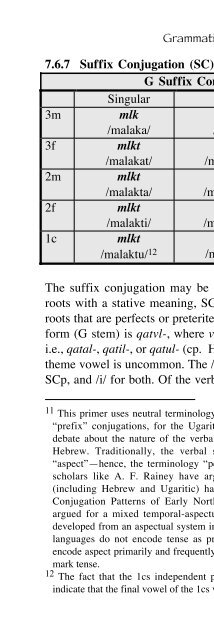A Primer on Ugaritic: Language, Culture, and Literature - enenuru
A Primer on Ugaritic: Language, Culture, and Literature - enenuru
A Primer on Ugaritic: Language, Culture, and Literature - enenuru
You also want an ePaper? Increase the reach of your titles
YUMPU automatically turns print PDFs into web optimized ePapers that Google loves.
Grammatical Précis 169<br />
7.6.7 Suffix C<strong>on</strong>jugati<strong>on</strong> (SC) — “Perfect” 11<br />
G Suffix C<strong>on</strong>jugati<strong>on</strong> (SC)<br />
Singular Dual Plural<br />
3m mlk<br />
mlk<br />
mlk<br />
/malaka/<br />
/malakaœ/<br />
/malakuœ/<br />
3f mlkt<br />
mlkt<br />
mlk<br />
/malakat/ /malak(a)taœ/ /malakaœ/<br />
2m mlkt<br />
mlktm<br />
mlktm<br />
/malakta/ /malaktumaœ/ /malaktum(uœ)/<br />
2f mlkt<br />
mlktm<br />
mlktn<br />
/malakti/ /malaktumaœ/ /malaktunaœ/<br />
1c mlkt<br />
/malaktu/ 12<br />
mlkny<br />
mlkn<br />
/malakniyaœ/ /malaknuœ/<br />
The suffix c<strong>on</strong>jugati<strong>on</strong> may be organized into two classes: first,<br />
roots with a stative meaning, SCs, i.e., “she was heavy”; sec<strong>on</strong>d,<br />
roots that are perfects or preterites, SCp, i.e., “she ruled.” The base<br />
form (G stem) is qatvl-, where v may be any of the short vowels,<br />
i.e., qatal-, qatil-, orqatul- (cp. Hebrew bAtDk, dEbDk, <strong>and</strong> lOkÎy). The /u/<br />
theme vowel is uncomm<strong>on</strong>. The /a/ theme vowel is reserved for the<br />
SCp, <strong>and</strong> /i/ for both. Of the verbs II-}, in which the quality of the<br />
11 This primer uses neutral terminology, i.e., the descriptive terms “suffix” <strong>and</strong><br />
“prefix” c<strong>on</strong>jugati<strong>on</strong>s, for the <strong>Ugaritic</strong> verbal system. Scholars c<strong>on</strong>tinue to<br />
debate about the nature of the verbal system in <strong>Ugaritic</strong> as well as Biblical<br />
Hebrew. Traditi<strong>on</strong>ally, the verbal system has been described as having<br />
“aspect”—hence, the terminology “perfect” <strong>and</strong> “imperfect.” More recently,<br />
scholars like A. F. Rainey have argued that the West Semitic languages<br />
(including Hebrew <strong>and</strong> <strong>Ugaritic</strong>) had a temporal system (see “The Prefix<br />
C<strong>on</strong>jugati<strong>on</strong> Patterns of Early Northwest Semitic,” 407–20). Others have<br />
argued for a mixed temporal-aspectual system. Segert argued that <strong>Ugaritic</strong><br />
developed from an aspectual system into a temporal system (BGUL, 56). Most<br />
languages do not encode tense as primary. Hebrew, for example, seems to<br />
encode aspect primarily <strong>and</strong> frequently employs sec<strong>on</strong>dary temporal markers to<br />
mark tense.<br />
12 The fact that the 1cs independent pr<strong>on</strong>oun is /anaœku/ with a final /u/ may<br />
indicate that the final vowel of the 1cs verb suffix is likewise /u/.


